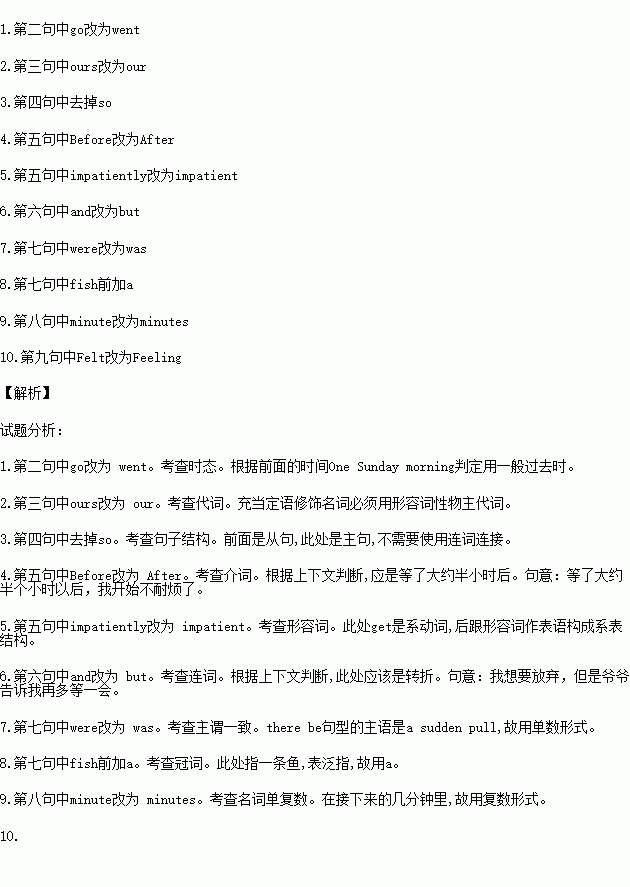ΧβΡΩΡΎ»ί
ΕΧΈΡΗΡ¥μ
ΦΌΕ®”Δ”οΩΈ…œάœ Π“Σ«σΆ§Ήά÷°ΦδΫΜΜΜ–όΗΡΉςΈΡΘ§«κΡψ–όΗΡΡψΆ§Ήά–¥ΒΡ“‘œ¬ΉςΈΡΓΘ
ΈΡ÷–Ι≤”–10¥Π”ο―‘¥μΈσΘ§ΟΩΨδ÷–ΉνΕύ”–ΝΫ¥ΠΓΘΟΩ¥Π¥μΈσΫω…φΦΑ“ΜΗωΒΞ¥ ΒΡ‘ωΦ”ΓΔ…Ψ≥ΐ
Μρ–όΗΡΓΘ
‘ωΦ”:‘Ύ»±¥ ¥ΠΦ”“ΜΗω¬©Ή÷ΖϊΚ≈(ΓΡ)Θ§≤Δ‘ΎΤδœ¬Οφ–¥≥ωΗΟΦ”ΒΡ¥ ΓΘ
…Ψ≥ΐ:Α―Εύ”ύΒΡ¥ ”Ο–±œΏ( \ )Μ°ΒτΓΘ
–όΗΡ:‘Ύ¥μΒΡ¥ œ¬Μ°“ΜΚαœΏΘ§≤Δ‘ΎΗΟ¥ œ¬Οφ–¥≥ω–όΗΡΚσΒΡ¥ ΓΘ
ΉΔ“β:1.ΟΩ¥Π¥μΈσΦΑΤδ–όΗΡΨυΫωœό“Μ¥ ;
2.÷Μ‘ –μ–όΗΡ10¥ΠΘ§Εύ’Ώ(¥”ΒΎ11¥ΠΤπ)≤ΜΦΤΖ÷ΓΘ
My grandfather and I enjoy fishing. One Sunday morning we go fishing at a lake. We took ours fishing poles and headed for the lake. As soon as we arrived, so we dropped the lines into the water. Before waiting for about half an hour, I was beginning to get impatiently. I wanted to give up, and my grandfather told me to wait a little longer. Finally, there were a sudden pull at the pole and fish was caught. Within the next few minute, my grandfather also caught a fish.
Felt hungry, we built a fire by the lake and barbecued the fish. It was delicious.

